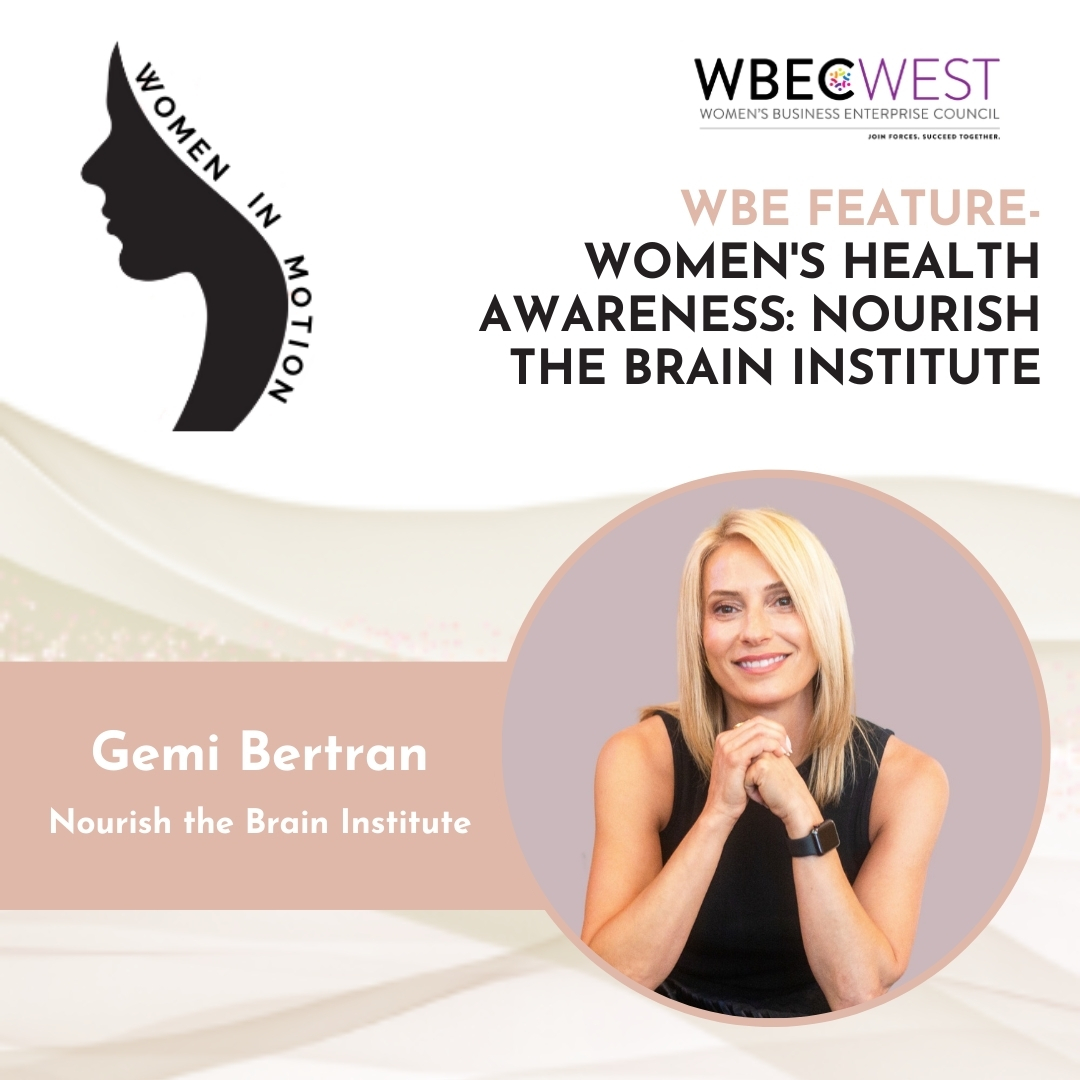
In this episode of Women in Motion, Lee Kantor talks with Gemi Bertran, founder of Nourish the Brain Institute. Gemi discusses the institute’s evolution from providing brain and behavior coaching to offering accredited programs for upskilling injured workers in California. She explains the role of a brain and behavior coach in addressing issues like depression, anxiety, PTSD, and the importance of lifestyle choices for brain health. Gemi also shares dietary tips for brain health and the effectiveness of their holistic approach.
 Gemi Bertran, PhD, is the visionary behind the Nourish the Brain Institute, championing integrated behavioral and neurological health training. With advanced degrees in cognitive sciences and a passion for holistic wellness, she has developed innovative programs addressing PTSD, TBI, and mental health challenges. Her work is crucial for First Responders and those experiencing trauma, providing tools for resilience and recovery.
Gemi Bertran, PhD, is the visionary behind the Nourish the Brain Institute, championing integrated behavioral and neurological health training. With advanced degrees in cognitive sciences and a passion for holistic wellness, she has developed innovative programs addressing PTSD, TBI, and mental health challenges. Her work is crucial for First Responders and those experiencing trauma, providing tools for resilience and recovery.
As an esteemed author of “The Fabulous Brain” and a compelling public speaker, Gemi’s insights bridge scientific understanding and practical strategies for improving cognitive function and behavioral health. Her bilingual proficiency in English and Spanish expands her impact, reaching diverse communities. 
Under her leadership, the institute has launched impactful initiatives like the Veteran Outreach Program, emphasizing the importance of community support and preemptive mental health training. Gemi’s approach is grounded in the belief that education and understanding pave the way for healthier, more resilient individuals and societies.
Follow Nourish the Brain Institute on LinkedIn and Facebook.
Music Provided by M PATH MUSIC
![]() This transcript is machine transcribed by Sonix
This transcript is machine transcribed by Sonix
TRANSCRIPT
Intro: [00:00:07] Broadcasting live from the Business RadioX Studios, it’s time for Women In Motion. Brought to you by WBEC-West. Join forces. Succeed together. Now, here’s your host.
Lee Kantor: [00:00:27] Lee Kantor here. Another episode of Women In Motion, and this is going to be a good one. But before we get started, it’s important to recognize our sponsor, WBEC-West. Without them, we couldn’t be sharing these important stories. Today on the show we have Gemi Bertran with Nourish the Brain Institute. Welcome.
Gemi Bertran: [00:00:47] Thank you. Thank you for having me.
Lee Kantor: [00:00:50] I am so excited to learn what you’re up to. Tell us about Nourish the Brain Institute. How are you serving folks?
Gemi Bertran: [00:00:58] Nourish the Brain Institute started with the idea of a very specialized brain and behavior coaching, and then it morphed towards a school, and now we are providing training. We are an accredited school. Our programs are in the ETPL list. That means that we work with the State of California through injured workers to provide them upskilling or reskilling their careers. Also, we have a GSA contract. We are federal contractors. And we are in the midst of working with a medical organization for brain mapping that is going to make our work much easier. So, this is what basically we have going on right now.
Lee Kantor: [00:01:51] So, for the people who aren’t familiar, do you mind sharing a little bit about a brain and behavior coach, like what do you do and what is the problem I’m having where I would need a brain and behavior coach.
Gemi Bertran: [00:02:02] So, brain and behavior coach is designed and stemmed from my brain issue that I had many years ago. I was working overseas, I was an independent auditor for nonprofits, and my brain broke due to a stress. And when I say my brain broke, it didn’t break physically, but the stress caused for my body to stop functioning the way that it used to.
Gemi Bertran: [00:02:29] So, the doctors didn’t know what was going on, so I started doing research, and I learned the things that work and don’t work for the brain. Because anything that we do, we think, and we eat changes the chemistry in our brain and that facilitates difficulties, neuroplasticity, which is the capacity for our brain to recover from almost anything and everything. So, I became very, very knowledgeable since I am a researcher, very knowledgeable with the type of foods and superfoods and the things that create homeostasis in our brain chemistry and that enhances recovery and the processes of healing.
Gemi Bertran: [00:03:16] So, our coaches, our graduates help people to address those behaviors that can cause a problem on their health. It can be anything related with depression and anxiety. Actually, I’ve been training and working with special forces officers for years through multiple organizations and also police officer survivors through Wounded Blue, and we coach them and we help them to readdress anything that is related with PTSD or TBI, trauma, and also regular health issues such as type 2 diabetes or anything related with immunodeficiencies. So, our coaches help people to readdress whatever is not working in their overall health and can be improved through improving brain health.
Lee Kantor: [00:04:18] So, how does an individual know if I should contact a brain and behavior coach or a therapist?
Gemi Bertran: [00:04:29] It’s interesting. This is a really, really good question. Often what happens is people that comes and finds a brain and behavior coach is because therapy hasn’t worked. We can go so far with therapy, but there is one thing that we do all the time – not all the time, but we do at least two or three times a day, which is eating. And those habits are creating the perfect environment for our brain to address whatever therapy addresses or it can create interferences in whatever therapy addresses too. We can go to therapy once a week, but we eat three times a day. And if we go to therapy once a week and the rest of the time we are not taking care of our own health, therapy is pointless, often.
Lee Kantor: [00:05:35] Now, can you share for the listeners some maybe low hanging fruit in terms of what they can be consuming, I guess food and drink wise, that can help create that healthier brain environment.
Gemi Bertran: [00:05:51] So, I mean like the basics, but there is things that people doesn’t think that are detrimental for their health. One of the things that causes the most problems and more difficulties on the brain chemistry to go back to homeostasis is stress. We don’t eat anything that causes stress, but we have a lot of behaviors that create the stress in our life.
Gemi Bertran: [00:06:24] Like just getting stuck in traffic is stressful, right? So, what we want to do is to create and have the brain to go back to health. It means that stress is not going to go away because you will be in traffic again tomorrow. But if you can eat things that will calm down your brain and have your brain more resilient, that will aid to stress be less damaging.
Gemi Bertran: [00:07:01] I’m going to give you a few things that are creating that more perfect environment for the brain. Good fats are extremely important because our brain, for the most part, is fat. And when I say fats, I mean plant-based such as coconut oil, olive oil, always cold pressed and organic, avocado oil, fish oil, especially salmon or cod liver oil. Those help the brain to be more flexible. Then, lean proteins such as good quality fish, good quality chicken, always organic. Also, plant-based protein, if you are vegan or vegetarian. Those things help a lot.
Gemi Bertran: [00:07:55] But the one thing that enhances all the benefits of that are the superfoods, like microalgae such as chlorella or spirulina, because those enhance oxygen and then that creates more oxygenation on the blood supply, not only on the brain, throughout the body. It means that there is more cell regeneration. It helps to enhance brain oxygenation so we don’t feel so tired, we don’t have low energy. Your energy levels go up. We have mushrooms such as lion’s mane, cordyceps, chaga that help brain health. Again, maca, which helps to balance brain hormones. There’s all kinds of things.
Lee Kantor: [00:08:49] Now, if somebody is working with you, how quickly do they see a positive response? Is this something that takes a long, long time in order to see the benefits? Or is it something that if you changed certain foods or start eating more of the right foods that you get a benefit pretty quickly?
Gemi Bertran: [00:09:07] So, the problem often is not to eat the right foods. Often it’s the wrong things that we do or the wrong foods that we eat. We can eat good foods most of the time, but then – I don’t know – drinking too much alcohol to cope with the stress. So, that’s when a brain and behavioral coach is so helpful because it addresses everything holistically. So, it just kind of helps you to balance the things that we do right and the things that we do wrong.
Gemi Bertran: [00:09:43] Often it doesn’t take much. I mean, we had clients with all kinds of issues, like really, really bad trauma, many, many brain injuries, and often it takes a couple of weeks, a month to start feeling very different. In extreme cases, like there is a lot of depression or anxiety, it might take a little bit longer. I always say, if you do what I’m telling you to do, you will be healed, feel so much better no longer than six months. I mean, you will be able to take control of your own health —
Lee Kantor: [00:10:39] Now, you mentioned that the genesis of this concept was kind of personal. When did you start kind of realizing, hey, I think I’m on to something. Like, what were some of the clues that you had early on that said, you know what, I think I’m going in the right direction.
Gemi Bertran: [00:10:58] Well, I mean, the first clue was when I did heal myself from that. All of a sudden, my body is not functioning – I mean, I couldn’t move. I was laying in bed, and one morning I woke up, I knew I wasn’t dead because I had thoughts, but my body was not responding. I couldn’t lift up my leg. I couldn’t do the things that I usually do.
Lee Kantor: [00:11:29] But then something changed?
Gemi Bertran: [00:11:32] Yes. So, what happened is, later on, I worked as a business director in a behavioral health facility, and I realized how much medicine is provided to people with brain and behavioral issues instead of addressing the basics, which is the things that we do the most, like exercise, relationships, meditation, eating habits, education about what are the foods that are going to help to support where you want to be instead of supporting the things that you know that are detrimental for your own good.
Lee Kantor: [00:12:17] And then, at what point did you start kind of certifying people and getting people interested in becoming coaches?
Gemi Bertran: [00:12:26] So, that happened around a year ago when we created the course, and then you have to go through the whole process of the BPP, and that takes very, very long time and it’s costly and very demanding. And then, we got into the ETPL, which speeds things up really quickly. So, yes, about that time.
Lee Kantor: [00:12:54] And then, who is a good candidate to become a brain and behavior coach? What are they currently doing now?
Gemi Bertran: [00:13:03] People take this type of education for many reasons, often for themselves. Some people got to a place – such as I was – and they decide if I am going to take any kind of education, I’m going to take care of myself, and this is what I’m going to do. But in many cases, it is people that is already related in a way or another within the mental and behavioral health already. We have people that are therapists, psychologists. We have some doctors and nurses. We have people that is already a drug and alcohol counselor. We have people that is in the fitness industry. We have all sorts of people that they are already on the well-being business. But anybody can take this course. Like, again, we have special forces operations officers that they are taking this course, police officers, because what we do is also create community within the groups and they get to have peer-to-peer support which is extremely, extremely helpful.
Lee Kantor: [00:14:29] Now, can we talk a little bit about the book The Fabulous Brain? How did that come about?
Gemi Bertran: [00:14:36] Well, that book came out of my own experience, what I had to go through, and just to give an example of what us, as human beings, individually can do for our own good, for our own health. Often we rely on other people, such as coaches or doctors or therapists or psychologists to take care of us. And often he says, as simple as addressing your own eating habits and the things that we do and we don’t do. And it’s fairly simple. It’s just sometimes we need help, sometimes we can do it ourselves. So, the book came out out of being able to help people to do it themselves if they want to.
Lee Kantor: [00:15:31] Now, can you talk a little bit about why it was important for you to become part of WBEC-West?
Gemi Bertran: [00:15:39] Well, I am always for women. Anything that we do, especially if we do it together, if we are able to support each other, it just makes everything way better. These organization, especially, I really enjoy because, for once, it gives you that special and better place within the federal contracting world. Like I am WOSB business, so we always have set asides, that’s one thing.
Gemi Bertran: [00:16:21] But the other thing is, through newsletter, you are always on top of whatever it is for women in business that is trendy or is important or you have grants. Or whatever they are, they have on their reach, they put it in front of you. Which in other ways, like if I wasn’t, I will never find out because you don’t have time to go through, to research things on your daily basis. It’s just super easy when you find it in your inbox from them.
Lee Kantor: [00:17:00] So, what do you need more of? How can we help you?
Gemi Bertran: [00:17:05] Well, I’m going to tell you a little bit about the reason why I created the program, because I think it’s my purpose in life. The program is originally designed to address and prevent suicide within the military and the police force. We all know that in the military, there is 21, 22 members that they are all retired, about to retire, and they attempt or commit suicide in a daily basis. Until the last year, the FBI start counting how many police officers commit suicide, which is from 300 to 500 percent more than the ones that die in the line of duty. The program is designed for them to take the course while they are taking training after recruitment.
Gemi Bertran: [00:18:08] The reason why I created the program is because, in 2004 when I was ready to pick up my daughter – I adopted my daughter from Haiti – I was ready to go to Haiti, and Haiti got into a coup d’etat, so I was forbid to go to the country. And I knew that they were most likely going to die because what was happening there politically or because hunger. And I flew to Dominican Republic and there was no flights to go to Haiti. What I did it was to find an Air Force guy, and thanks to them, they flew me to Haiti. And thanks to that, I could rescue my daughter from the orphanage. And that was the reason I made the promise that I will do whatever I could if I had a chance. And because I did have the chance, I took action. So, that’s my goal.
Lee Kantor: [00:19:13] So, now you want to share this knowledge and this type of program with more and more of first responders and folks like that?
Gemi Bertran: [00:19:22] Yes. Yes. First responders is my main goal because they are the ones that defend our country and they get in trouble. And when they retire, they are not good for anybody else. So, it’s just really, really sad to think that that’s the only exit they can see in that moment.
Lee Kantor: [00:19:50] So, now, if somebody wants to learn more what is the website? What’s the best way to connect?
Gemi Bertran: [00:19:57] So, the website is ntbu.org or nourishthebraininstitute.com or nourishthebrain.com. All of them redirect to the same place. I always say ntbu.org because it’s the easiest one.
Lee Kantor: [00:20:13] Yeah. N-T-B-U-dot-O-R-G. Thank you so much for sharing your story today. You’re doing such important work and we appreciate you.
Gemi Bertran: [00:20:22] Thank you so much.
Lee Kantor: [00:20:23] All right. This is Lee Kantor. We’ll see you all next time on Women In Motion.














